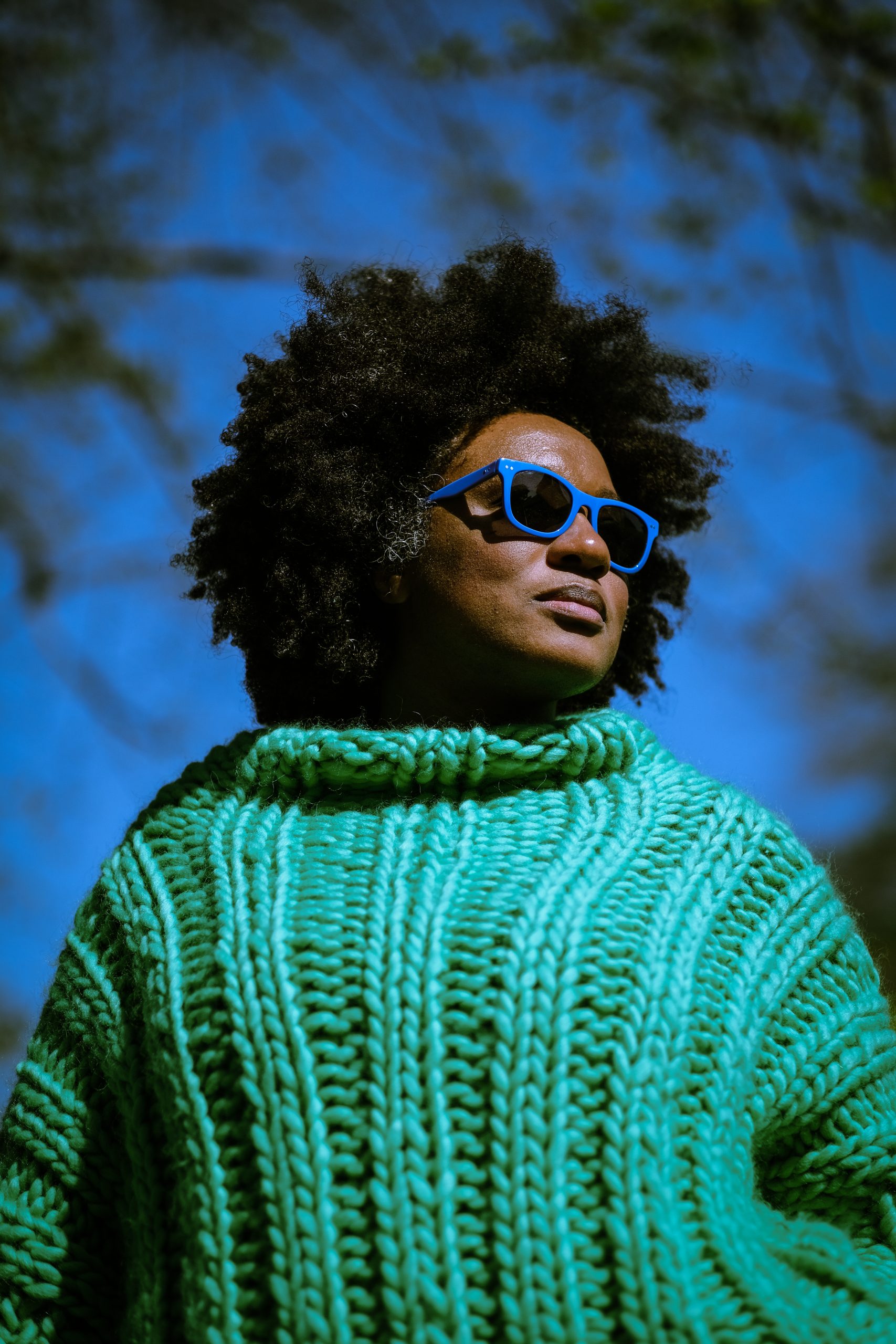
Friendship: The Greatest Love Story | With Aja Barber
Society encourages us to view romantic relationships as the primary foundation in our lives – why aren’t friendships viewed as equally important?
Due to its patriarchal roots, society has continued to encourage us to prioritise romantic relationships. Women, in particular, have been urged to find lifelong partners before they are 30, or else they run the risk of no longer being able to have children – often viewed as the primary reason for their existence. However, some people are beginning to realise the profound influence of friendship on our lives.
Aja Barber, writer, stylist, and consultant (primarily concerned with sustainable fashion), sheds light on the interplay between friendships and romantic relationships, drawing from her personal experience. This conversation dissects the fine line between romantic and platonic relationships, and how to maintain happy and healthy relationships in these different yet similar parts of our lives.
DEFINING FRIENDSHIP
What does friendship mean to women/people today?
I actually want to write about female friendships because I think it’s really interesting and complex, especially when you add in elements of race. I would not be anywhere where I am on social media without the friendship of women and non-binary people and trans women. I wouldn’t be anywhere.
Why does society place so much emphasis on romantic relationships? Is this outdated?
Totally outdated. Could you immigrate to another country for a platonic relationship? We don’t value that sort of thing. Say your life partner is someone you have a platonic relationship with, you couldn’t move to the same country as them if they have a different nationality. So yeah I think we have totally outdated views towards what sort of love we value in society.
If friendships are so valuable to us, we have to question why society has taught us not to view them as equally important to romantic relationships. Society does play a part in how we view our friends, particularly in male friendships.
DECONSTRUCTING SOCIETY’S PERCEPTION OF FRIENDSHIP
Does toxic masculinity potentially impact men’s ability to form meaningful relationships?
Toxic masculinity does such a disservice for men. I look at my dad, for instance, he’s a senior citizen. Covid has been hard for everyone, but I think it’s harder for older men to have friends. Especially if your friendships surround social gatherings and that sort of thing or playing a contact sport, then what do you actually have when these activities aren’t allowed? Whereas, luckily to be a person of a marginalised gender it is not uncommon to pick up the phone and phone a friend and shoot your shit. I think I have a voice note conversation with at least one friend every single day. And I don’t think men are allowed that same agency over friendships. There is a lot of toxic masculinity surrounding what kind of friendships you can have as a man and I think that’s quite sad. I feel like for a man you can’t just meet someone cool and be like ‘you wanna hang out and do things?’

Hopefully, men are becoming more aware that it does not undermine their masculinity to love and rely on their friends the same way women and non-binary people do. Although women suffer from a different problem. Do women feel guilty for prioritising romantic relationships over friendships? Have you ever felt guilty for ‘choosing’ a romantic endeavour instead of spending time with your friends?
You know what it is, I was single for a very long time, and I think the guilt comes from a place of remembering what it feels like to be left alone when your friend gets a partner. I don’t trust people who disappear when they get in a relationship. If you disappear when you get in a relationship, then stay gone. It’s hard when it does fall apart but they always suddenly resurface and are like ‘hey let’s be friends’. It’s very important to me in my romantic relationship, and this is the longest romantic relationship I’ve ever had, to be sure and ensure I leave space for my platonic friendships. I think your soulmate can be a lot of different things and it doesn’t have to be a romantic thing. I think my friends are very much my soul mates in a lot of ways. I think romantic partnerships sometimes have to prioritise certain things, so I see nothing wrong with prioritising things in your friendships as well. In my romantic partnership we prioritise going to see both sets of parents, so why wouldn’t I prioritise certain things in my friendships? I refuse to feel guilty for prioritising anything that brings me joy.
In agreement with Aja, a lot of people seem to view romantic relationships as a more permanent fixture in life, but it can be the other way round. Friends can be a lot more solid in trying times. It helps to have someone to ground you, external from your romantic relationship.
Marriage is hard. Everyone says it’s hard, but you don’t realise how hard it is until you’re in it. I know a lot of marriages that fell apart in the pandemic because no one signed up for that much time together. I always joke about the fact that no one won in the pandemic, everybody lost.
Friendships should be an escape from the stress of life. In order for friendships to flourish we need to be able to set boundaries. It can be hard, but it helps establish a healthy friendship in which people can be honest with each other. How important is it to set boundaries in friendships?
I think it’s harder to set boundaries in friendships because I think a lot of people don’t realise what boundaries look like. I have had a lot of people who will do something crappy and be like ‘i’m setting a boundary’, but it’s like no, you’re not setting a boundary, you’re evading responsibility and not owning up to your mistake. I feel like everyone talks about boundaries but not everyone understands what they should look like.
Does the fact that we are not as expected to set boundaries in platonic relationships derive from the fact that society does not take them as seriously as romantic relationships?
Yeah. That’s very, very true. You know, I think every time someone has done the ‘i’m setting boundary’ thing when you ask them for accountability, it’s always a person I was really suspicious of from the start. I feel like real friends that are going to be in your life for a long time, you can express boundaries if you need to, but you almost don’t even need to express them. They are not going to treat you in a way that they don’t want to be treated. Talking about boundaries is important and it is good, but I also think the perfect friendship is when you don’t have to ask the person not to do something that is going to hurt your feelings because they paid enough attention to what you’ve been saying that you don’t have to spell it out. It is different if you start living with a friend and you need to set boundaries like please don’t borrow my clothes without asking, I totally understand having a boundary conversation like that. But with most of my friendships, I feel like I don’t need to be like ‘this is a boundary’ because if your friends are paying attention, and being not just respectful – but intuitive, then you almost don’t need to spell it out that way.


A GUIDE TO HEALTHY AND HAPPY FRIENDSHIPS
What are some qualities that you think are important in friendship/ what makes a good friend?
People that meet you halfway. Friendships where it isn’t one-sided, and where it’s fair but it can be very unspoken. There was a time period when I did not have much money and I was living at home, and I had a friend who was married and they lived in a house. Every time we would go out she would say it was her turn to pay, but it really wasn’t, she was just doing it because she was being thoughtful. She knew that she had a partner, and whilst we both had jobs, I was living in my mom’s basement. It’s quite a different thing. She suggested that we go to a movie so she would treat me because she knew I was in a different financial place to her – that’s being an intuitive friend. And I feel like not many people grasp that that’s the perfect part of a friendship. Now that I am in a different place, I always treat her. I recognise that she did that when I wasn’t in the same place as her financially and she recognised that, without making me feel bad about it.
Listen to the things that upset and bother your friends. Often someone doesn’t have to tell you something is a trigger. If you listen, you might be able to tell if someone struggled with disordered eating in the past so you may need to be more conscious when you talk about sizing around them. I think if we are truly listening to people, oftentimes you don’t have to have the boundary conversation as you don’t have to spell it out for everyone. That’s the perfect friendship for me in a way.
I remember once I was telling a friend about how an acquaintance had made me feel bad, but I couldn’t quite figure out why. My friend was like ‘this person used you’. Sometimes I think because women are told not to recognise our full value in society, (I do that to myself sometimes) I will question whether I have the agency to feel used by this person, so it’s nice to have a friend to tell me ‘no, what this person did to you was completely disingenuous’. Thank you for confirming what I already thought but what society has spent years telling me if I think of myself that way then I am egotistical. Sometimes I think friends can really confirm things for us and it’s really helpful when a friend recognises bad behaviour and tells you. It can be really helpful just to feel validated.
CONCLUSION
It can be so easy to come up with excuses of why someone has treated you a certain way – it is definitely important to have a friend external from the situation to be given an unbiased perspective. Thank you to Aja Barber for sharing her thoughts on the importance of friendship and pondering why we are prompted to gloss over the value it can bring to our lives.








